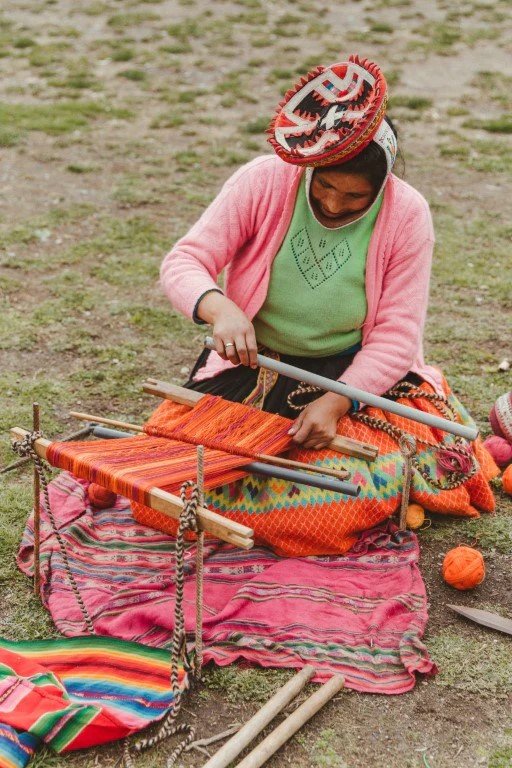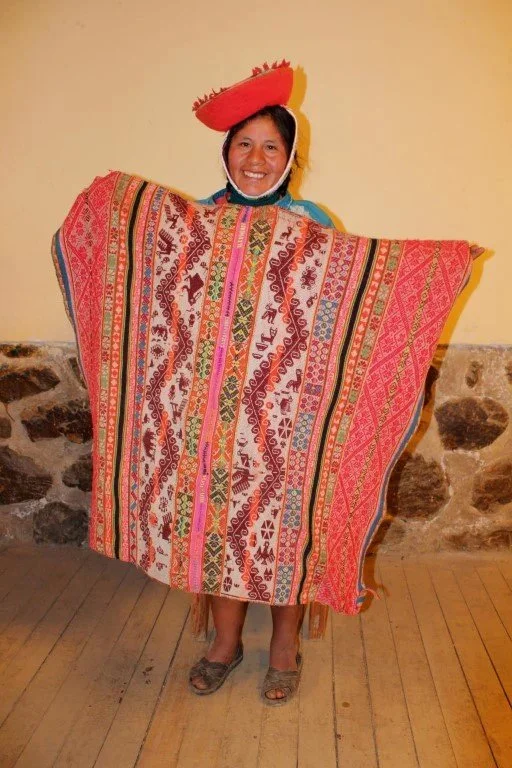Preserving Tradition and Empowering Women: The Story of Amawaki
In the picturesque yet isolated regions of the Peruvian Andes, nestled between majestic mountains and vibrant valleys, lies a community-driven initiative that’s not only preserving age-old traditions but also empowering women in the most profound ways. This is the story of Amawaki, a non-profit organization dedicated to the art of traditional weaving, sustainable tourism, and the betterment of local communities.
The Birth of Amawaki: A Vision for Sustainable Development
Amawaki was founded in 2009 with a mission to uplift women in remote Peruvian communities through various initiatives, primarily focusing on traditional textile weaving. The organization's roots trace back to a profound commitment to sustainability, cultural preservation, and community empowerment. It was founded by a visionary executive director Kennedy Leavens who, recognizing the potential of traditional craftsmanship, sought to create a platform where these artisans could showcase their work to the world, thereby earning a fair income and gaining recognition.
Melissa Tola, the Sales Manager in Amawaki, shared her journey during a recent interview. Hailing from Lima with a background in sustainable and luxury tourism, Melissa was drawn to Amawaki’s mission from the moment she encountered the organization. "I met the executive director when she was working with artisans at a fair in New York," she recalls. "I was captivated by her vision and knew that one day, we would work together."
The Art of Weaving: A Heritage Under Threat
One of Amawaki's core activities is preserving the traditional art of backstrap loom weaving, an intricate craft passed down from generation to generation among women in the region. This ancient technique, once widespread across Peru, is now confined to a few areas, including Cusco and Puno. It’s a skill that embodies the cultural heritage of these communities, yet it faces a critical challenge—modernity.
"The younger generation is increasingly disinterested in learning weaving," Melissa explains. "Many of the children aspire to leave their villages, pursue education in larger cities, and take up professions far removed from their cultural roots. They see no future in staying in a community without even basic amenities like the internet."
Amawaki is determined to change this narrative. By involving women in sustainable tourism initiatives, they aim to make the craft of weaving not just a source of income but a matter of pride. "Through our tours, visitors not only learn about the weaving process but also get to interact with the artisans, which helps them appreciate the skill and effort involved," Melissa says. "This, in turn, encourages the women to pass on their knowledge to their daughters, ensuring the tradition lives on."
Empowering Women Through Education and Collaboration
Amawaki’s mission extends beyond cultural preservation. The organization is also focused on education and economic empowerment. They conduct workshops that teach women crucial skills such as pricing their products, time management, and teamwork. "These women often undervalue their work," Melissa points out. "Our goal is to help them understand their worth and how to negotiate fair wages."
Collaboration is another key aspect of Amawaki’s strategy. The organization works closely with designers, both local and international, to create products that are not only traditional but also marketable to a global audience. One such collaboration involves Alejandra Carrillo-Munoz, a designer from Mexico who visits Peru annually to work with the artisans. "She brings in new ideas, researches trends, and together with the women, they create designs that blend traditional motifs with modern aesthetics," Melissa explains.
This partnership has led to the creation of unique products that stand out in the market for their quality and authenticity. "We use the finest materials available, such as alpaca and sheep wool, combined with traditional designs. The result is a high-end product that reflects the rich cultural heritage of the region."
Challenges and Triumphs: The Journey Through COVID-19
Like many organizations worldwide, Amawaki faced significant challenges during the COVID-19 pandemic. The isolation caused by lockdowns set back their progress by years. "We were completely cut off for two years," Melissa recalls. "All the advances we had made with the women were almost wiped out, and we had to start over."
Despite these setbacks, Amawaki has managed to persevere, largely due to the unwavering commitment of its team and the resilience of the communities they work with. They are now focused on rebuilding and expanding their programs. "We want to double the number of workshops we offer and continue to provide the women with the tools they need to succeed," says Melissa.
Sustainable Tourism: A Gateway to Cultural Exchange
One of Amawaki’s most innovative initiatives is its sustainable tourism program. Given their proximity to Machu Picchu, the organization saw an opportunity to attract tourists interested in more than just the famous Incan ruins. "Most tourists pass through without spending time in our region," Melissa notes. "We wanted to create an experience where visitors could learn about weaving, meet the artisans, and immerse themselves in our culture."
This program not only provides a source of income for the women but also fosters a deeper appreciation for their craft among visitors. "When tourists see how difficult it is to weave even a simple bracelet, they leave with a newfound respect for the artisans," Melissa explains. "This makes the women proud of their work and encourages them to continue the tradition."
Looking Ahead: Expanding Horizons and New Initiatives
As Amawaki moves forward, their goals are both ambitious and grounded in their original mission. They aim to continue empowering women, expanding their reach to include more communities, and introducing new products. "We’ve been working on the same types of products for the past six years," Melissa admits. "Now, we’re looking to innovate and diversify our offerings."
One exciting development is the introduction of new products like luxurious fanny packs and tote bags designed with both function and fashion in mind. These items are crafted with the same attention to detail and cultural significance as their traditional textiles but cater to a broader market.
Melissa’s passion for her work is evident not just in her words but in the results Amawaki has achieved. The organization is the only non-profit in the region that survived the pandemic, a testament to their resilience and the deep connections they’ve built with the local communities.
Conclusion: The Lasting Impact of Amawaki
Amawaki’s story is one of hope, resilience, and the power of community. Through their efforts, they have not only preserved a dying art form but have also empowered countless women, giving them the tools to build a better future for themselves and their families. As they continue to grow and innovate, Amawaki remains a beacon of what can be achieved when tradition meets modernity, and when cultural preservation goes hand in hand with economic empowerment.
ABOUT MELISSA TOLA
Melissa Tola is a seasoned professional based in Lima with a rich background in sustainable and luxury tourism. Her journey with Amawaki, a nonprofit organization dedicated to empowering women artisans in rural Peru, began in 2018. With a deep passion for sustainable tourism, Melissa has played a pivotal role in developing and promoting tours that highlight the rich cultural heritage of the communities near Machu Picchu, emphasizing the importance of preserving traditional weaving techniques.
Through her work, Melissa has been instrumental in creating opportunities for local women to showcase their craftsmanship to the world. Her efforts have focused on not only helping these artisans market their unique textiles but also on providing them with the tools and knowledge needed to value their work appropriately. Melissa's commitment to sustainable tourism and her dedication to empowering women in these communities have made her an integral part of Amawaki's ongoing success.











